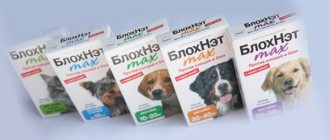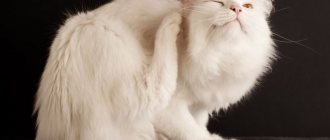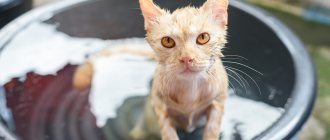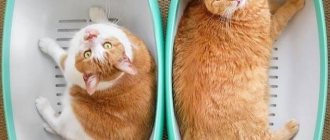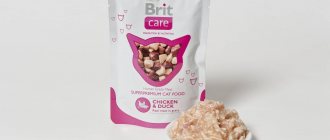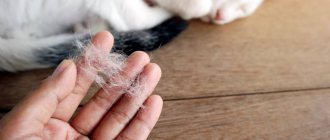Flea shampoo for cats is very popular due to its ability to cause the death of blood-sucking parasites, cleanse the fur and skin of impurities, and make it easier to comb pets with long and thick hair. The correct choice of this hygiene product should be made taking into account the age, physiological condition and breed in order to bring maximum benefit and not harm the health of the animal. An equally important factor is compliance with all instructions when using detergent insecticidal preparations.
How does flea shampoo work?
When using flea shampoo, you will simultaneously perform 2 tasks: tidy up the animal’s fur and destroy parasites.
Such products not only wash off, but destroy all fleas. Some shampoos contain additional components from medicinal herbs. They soften itching, relieve skin irritation and promote healing of wounds and ulcers. To choose the right drug, you need to know how flea shampoo works. There are 2 categories of detergents against parasites: therapeutic and preventive. If your pet has not yet acquired harmful insects, wash it with shampoo containing essential oils. The smell of these drugs repels fleas, and the cat will return from a walk without unpleasant guests.
Medicinal shampoos include the plant poison pyrethrum, isolated from Persian chamomile. The drug penetrates the blood of insects, paralyzes their nervous system, and the fleas die. You need to be very careful when using medications containing this toxin so as not to poison the animal. Detergents containing not very active analogues of pyrethrum: phenothrin or etofenprox have a more gentle, but less effective effect.
Flea and tick shampoo for cats can be purchased at any pet store. They are divided into two large groups:
- From parasites. Used in the presence of blood-sucking insects. Helps relieve pain and itching from bites, and makes it easier to endure constant inconvenience. It works most effectively with complex treatment.
- For prevention. Can be used regularly to prevent blood-sucking insects from appearing in your pet.
Detergents contain permethrin, which has a negative effect on parasites. In addition to the active substance, the composition includes additional components. These include various essential oils that improve the condition of the skin and coat of animals.
Advantages and disadvantages
Any cat shampoo has both positive and negative sides. Even knowing how to properly remove fleas from a cat using a detergent, you need to take into account some features.
Advantages:
- There are universal shampoos that are suitable for all breeds of cats.
- Simple application and rinse procedure.
- Low toxicity.
- You can buy cleaning products for kittens in pet stores.
Flaws:
- Most cheap cleansing compounds have minimal beneficial properties.
- To increase the effectiveness of flea shampoo, you need to combine it with insect drops. Because of this, the cost of the procedure increases.
You need to understand that high-quality products will be expensive.
What is the price
Owners who have encountered blood-sucking insects are interested in knowing how much cat shampoo will cost. The price depends on the composition of the detergent, the place of production and the volume of packaging. The price range can vary from 300–1000 rubles per bottle.
To choose the best and most effective anti-parasite product, you need to take into account the advice and recommendations of experienced pet owners and veterinarians. When choosing an insect repellent, you need to pay special attention to the composition.
We suggest you read: How many days do bedbugs appear?
If you have more than one pet at home, you need to choose a detergent that is suitable for all breeds of cats. With its help you can take care of both a kitten and an adult cat. There are also liquid and dry shampoos.
What is the best anti-flea shampoo for kittens - reviews and instructions for use
Find out which flea shampoo for cats received the most comments below. The peculiarity of this product is that it can be stored for no more than two months. After this period has expired, the effectiveness of the product is significantly reduced. The composition of the cosmetic product includes the main component - an insecticide and various base oils on a detergent basis. This helps keep your pet's coat soft and silky, as the instructions say.
The first place in the ranking of the most effective drugs is occupied by a product called Dana. This is a mild product that can remove the characteristic unpleasant odor, as well as kill insects, leaving behind a delicate and pleasant aroma. The product foams well and is washed off; it can even be used to treat the head of an animal.
The second most effective is a Russian shampoo called Barsik. This is the cheapest but most effective product that has restorative properties for the dermal and superficial layer of the animal’s skin. The composition includes a medicinal extract of celandine, which can not only eliminate fleas and ticks, but also leave a specific aroma for a long time that helps repel lice. The reviews are positive.
The best products from this category of products are considered to be cosmetic products that cause paralysis of the nervous system in pests and lice, including Lugovoi. In this case, the death of the insect is inevitable. One of the most popular and best shampoos is a product called Phytoelitta.
Anti-tick and anti-flea shampoo should have the following characteristics:
- 1. Easily foams and washes off.
- 2. Care for the cat’s skin and coat.
- 3. Effectively remove and destroy insects.
- 4. Do not irritate the mucous membranes of the eyes and ears of cats and kittens.
The main component of cosmetics called meadow is an extract from the flowers of common chamomile. Unlike its predecessors, this product does not irritate the mucous membranes, does not cause dryness and tightness, or discomfort in kittens. There are two products in the line that differ in age restrictions for use. A special composition has been developed for kittens, which is enriched with mink oil and an extract from mother and stepmother.
Among the common measures to get rid of ticks is the use of common celandine. At the same time, the most convenient and comfortable to use are special drops on the withers, which not only eliminate insects, but also get rid of them for a long time. You only need a few drops of the drug and you will save your pet from annoying neighbors. There are no negative reviews on the use of celandine and meadow remedy.
On average, on the Russian market the cost of a regular spray or balm ranges from 150 rubles. It is worth remembering that an expensive analogue is not always a high-quality product that can neutralize insects.
We suggest you read: Pregnancy in a goat: how long does it last, how to determine it
Instructions for the use of drugs against pests and ticks Lugovoy contains information on the frequency of use of the product. On average, it is recommended to wash your kitten no more than once or twice a month if necessary. It is important to maintain the specified amount of time on the kitten's fur.
Lugovoi shampoo for kittens 1 month of age is not recommended for use. If your baby has ticks, you need to wait about 2 months, after which you can bathe your pet. Before this, try to protect your pet from chemicals by combing out parasites with a comb.
Useful video
Check out visually how to wash a kitten for fleas!
When purchasing a purebred animal, be prepared for the fact that it requires more careful and expensive care. This statement especially applies to long-haired pets.
- Related Posts
- At what age can British kittens be bathed? How to wash properly for the first time?
- How to wash a kitten if there is no special shampoo? Is it possible to wash a kitten with regular shampoo?
- We bathe a small kitten at 1, 2, 3 months. Is it possible to wash a kitten?
Visually see how you can bathe a kitten with regular shampoo.
Today you found out how many times you can wash a kitten with shampoo and whether you can wash a kitten with baby shampoo and regular shampoo.
- Related Posts
- We bathe a small kitten at 1, 2, 3 months. Is it possible to wash a kitten?
- At what age can British kittens be bathed? How to wash properly for the first time?
- How to wash a kitten with flea shampoo? How often and with what should I wash my kitten for fleas?
The following recommendations will help you avoid health problems in your pet:
- Postpone water procedures for at least two weeks after vaccination.
- After castration, at least 10 days must pass.
- You should also not wet the kitten’s fur for three days before and after flea treatment. Although, at the age of up to 3 months, not all parasite remedies are allowed.
- There is no need for daily washing. As a result, the protective fat layer is washed away and the quality of the coat suffers.
- It is advisable to repeat water procedures no more than once a season, starting from the age of 3–5 months.
- If the kitten is wayward and likes to scratch, then carefully trim its claws before bathing.
- Wait 2-3 hours after feeding.
- It is worth bathing a cat of any age as soon as possible if it is taken from the street. But it is undesirable to accustom a domestic kitten to washing before it adapts to its new family. This takes about 2–3 weeks.
Bathing cats needs to be taken seriously. To avoid problems with age, it is better to accustom the kitten to washing before the age of one year, since an adult animal will desperately resist. By the way, for such alarmists they came up with dry shampoo that does not require contact with water. If necessary, you can bathe the baby completely, but not earlier than 2 weeks after birth. Still, it is better to postpone the procedure until the cat reaches 2–3 months of age.
bathing /
How to avoid re-infection
If you simply treat your cat with anti-parasitic detergent, fleas may soon reappear on the skin. Often insect larvae and eggs develop in the rug on which the animal sleeps, and after a few days the parasites will move to its fur. To completely get rid of insects, thoroughly wash all areas where your pet likes to lie. A solution of Bars shampoo is suitable for this purpose. After treatment, place insect repellent herbs under the cat mattress.
It is possible to see fleas on an animal’s body only when they have bred in large numbers. Single individuals are very difficult to notice. When several animals live in an apartment, but fleas have settled in the fur of only one cat, they will definitely spread to other furry pets. Carry out simultaneous treatment of all cats and dogs, as well as their sleeping places.
It is not recommended to allow animals on beds, chairs and sofas, but in most families this rule is not observed. If your cat likes to sleep on upholstered furniture, you need to thoroughly clean the room and treat all surfaces covered with fabric with flea repellent.
Stages of successful hygiene
It is advisable for one person to hold the animal and the other to wash it. The first rule when bathing your baby is in warm, but not hot, water. Its temperature should not exceed 38⁰ C. It is better to close the door to the bathroom tightly. A long-haired kitten must be combed first to untangle the clumps. Items you should prepare in advance:
- basin;
- ladle;
- warm water in a saucepan;
- hypoallergenic shampoo for kittens;
- 2–3 towels;
- cotton swabs for ears;
- cotton pads;
- hair dryer;
- reward treat.
Small cotton balls are used to plug the baby's ears to prevent water and detergent from getting into them. So much water is filled into the basin so that its level reaches the kitten’s neck. Calming the pet with quiet words, gently moisten the fur with a sponge or hand. For the first time, you should not immediately put the animal in the basin, otherwise it may frighten it.
Detergent "Clandestine"
If you have never used anti-flea shampoos for cats, it is advisable to consult a veterinarian before using it for the first time. Taking into account the age, state of health and the number of parasites that have settled in the cat’s fur, he will tell you what is the best way to wash the animal. If it is not possible to consult a specialist, the instructions for the drug will come to the rescue. You need to be especially careful when treating kittens, pregnant, old and weakened cats.
Regular hygienic shampoo will help wash away some of the parasites, but it will not cause them to go away. After washing, surviving fleas can crawl throughout the apartment, and soon they will again settle in the warm and nourishing hair of the animal. In addition, conventional products do not affect insect larvae and eggs.
To prevent medicated shampoo from harming your pet, wash the animal in a certain sequence. First, calm the cat, caress it, and then do the following.
- Take the animal under the belly and hold it tightly.
- Apply shampoo to the body, avoiding the ears and muzzle.
- Keep the cat in the basin for the time indicated in the instructions.
- Wash off the product with warm water.
- Examine the animal's face. If fleas have moved in, comb them out and destroy them.
- Comb the fur.
- Dry the animal with a towel or hairdryer.
“Clandestine” shampoo against fleas also protects animals from ticks. Extracts of medicinal plants promote the healing of wounds on the skin. Under their influence, the fur becomes soft and the pet takes on a well-groomed appearance. If there is a large infestation of parasites, the effectiveness of the procedures is low; this drug is more suitable for preventing and repelling insects.
We invite you to read: Turkeys: features of breeding and care – Agricultural portal
“Clandestine” shampoo has a gentle effect on the skin and mucous membranes. In case of accidental contact with eyes, it does not cause irritation. Suitable for bathing kittens. The composition includes vitamin B5, under its influence the hair follicles become stronger.
You need to know how to properly bathe a kitten with flea shampoo so as not to harm its body. Instructions for use:
- If the animal is being washed for the first time, it should be prepared in advance. To do this, you need to calm the animal and let it touch the water with its paws.
- Next, prepare a bowl of warm water.
- Plug the animal's ears with cotton wool soaked in vegetable oil.
- The cat is washed most often using a shower.
- Next you need to use shampoo. You need to squeeze the amount onto your hand and cover your pet’s fur from top to bottom using circular movements.
- The detergent composition is washed off by rain.
Knowing how to wash a cat, you can avoid harming its body.
Before washing your kitten, you need to heat the water to a temperature so as not to burn your pet. Next, you need to hold the pet with one hand and perform the procedure with the other.
After applying the detergent, you need to leave it on the wool for 5 minutes. If you do not wash it off for longer, your pet may become poisoned. Many owners ask whether it is possible to bathe a pregnant cat. Please consult your veterinarian before using the cleanser. The same applies to the condition of the pet after sterilization.
A common question is whether it is possible to wash a one-month-old kitten with flea shampoo. At an early age, blood-sucking parasites can cause irreparable harm to the animal's body. Pet stores have special flea shampoos for kittens that can be used at 1 month. Veterinarians advise starting to use them at 2 months.
Knowing how often you can bathe kittens and adult cats, you don’t have to worry about their health. At an early age, it is necessary to use a detergent only after consulting a veterinarian.
How many times to wash your pet is influenced by the frequency of parasite damage and the body’s reaction to chemical components.
Flea shampoos for cats can be purchased at any pet store. They effectively help against blood-sucking insects and can be used for prevention.
What to do next?
If the owner does not know how to bathe his pet, even the best shampoo will not save the situation. So:
- Gently comb out the fur, untangle the tangles and remove as much loose hair as possible;
- The animal’s ears must be protected with cotton balls;
- Concentrated detergent is diluted in proportions of 1k3, and regular shampoo 1k2;
- We remove all objects that can be broken, knocked over or caught at a safe distance;
- The optimal water temperature for the animal is 37C;
- Fill the bath with enough water so that its level reaches the cat’s belly;
- A special rubberized or silicone mat that has an anti-slip effect should be placed on the bottom of the bathtub. If you don’t have such a mat, you can use a regular terry towel;
- Calmly and confidently move the cat to the bathroom;
- Using an unbreakable, preferably plastic, container, water the animal with warm water. To prevent your pet from getting scared, it is better to start from the croup, gradually moving to the shoulders. This way the cat can get used to the sounds of flowing water and new sensations;
- Having thoroughly wetted the fur coat, apply shampoo along the hair growth with careful massaging movements and leave it for a few minutes;
- We wash off the detergent and apply conditioner. If the cat is very dirty and the fur is very tangled, repeat the shampoo application procedure again;
- In order not to weigh down or pollute the fur, detergents and conditioner must be rinsed off well;
- After completing the water treatments, wrap your pet in a towel that absorbs moisture. You cannot rub wet wool, as this can lead to the formation of tangles;
- If the room is warm and comfortable, do not use a hairdryer; let the animal dry on its own.
The most important thing you may need when bathing a cat is a calm, friendly attitude, confidence, and remember - no violence! An already frightened cat in such an environment acquires remarkable strength, which is fraught with scratches and bites for the owner. With the help of affection, tactile contact and persuasion, you can easily wash your cat without causing negative emotions in him.
How often should you wash a cat if she seems to lick herself? In fact, cat cleanliness is a popular stereotype. Not all cats take good care of their fur. When your pet starts to smell like a zoo, a reasonable question arises: to wash or not to wash?
How often can cats and kittens be bathed? Regarding this issue, the owners were divided into 2 camps. Some believe that cats themselves are extremely clean animals, and it is not necessary to bathe them, while others are sure that you need to help your pets and maintain their hygiene. This is not to say that any of them are wrong. The truth is somewhere in the middle.
Home / Cat care
If there was a talk show on television about the life of cats, we would often see the owners of these cute animals arguing about how to properly care for them.
Should I bathe my cat? Some argue that there is no need for this, because animals wash themselves perfectly with their tongues. The latter say that cats periodically need bathing and even enjoy it.
So who is right? Let's figure it out.
Does bathing a cat feel like torture? Find out how to carry out the procedure painlessly for the pet and its owners.
Even those who have never kept them at home are well aware of the relationship of cats to water. Purrs can't stand her and everything connected with her! And if there is a need to buy a cat, both the pet and its owner receive stress from the procedure, which often resembles an execution.
This happens because bathing rules are not followed and it happens in a hurry. Below are some tips that, if you listen to them, will not turn the bath into your cat’s favorite pastime, but will at least make it tolerable and harmless.
The reason that a cat was poisoned by anti-ectoparasite shampoo may be:
- getting the drug into the respiratory system or digestive tract;
- frequent use of the product, which has led to the accumulation of toxic substances in the body;
- individual intolerance to shampoo components.
Toxic substances that reach it through the milk of a mother treated for parasites can cause severe poisoning in a kitten.
We suggest you familiarize yourself with: Flea drops for cats barrier
The following signs may indicate poisoning:
- sudden attack of weakness;
- apathy;
- unsteadiness of gait;
- salivation;
- dilated pupils;
- vomit;
- pallor or cyanosis of visible mucous membranes;
- violation of movement coordination.
In case of mild poisoning caused by accidental ingestion of a small amount of shampoo, you can give the cat any adsorbent (white carbon, atoxil, enterosgel) and provide a sufficient amount of clean water. In the absence of vomiting, it can be induced by placing a pinch of salt on the root of the animal's tongue.
If the measures taken do not help, urgent hospitalization of the pet is necessary.
The kitten will remember the first contact with water for a long time, so you need to take the process seriously.
If your pet still has negative emotions, then next time he will fight back hard: scratching, biting and struggling with all his might. That's why you need to turn bathing not only useful, but also a pleasant pastime.
Some breeders claim that a kitten can be washed from the age of one month. This is explained by the fact that such a baby practically does not resist and does not scratch. But it’s not worth risking the baby’s psyche, because any unknown procedure is a great stress for him.
A cat of noble blood needs washing at an early age more for beauty than for cleansing. After all, before an exhibition you need your fur coat to look well-groomed and shiny. A kitten can be bathed from three months old if it has long or thick hair and undercoat. Some veterinarians recommend starting no earlier than five months of age. This includes Persian, British, Scottish and other breeds.
There are always a lot of fleas living on the skin of outdoor cats. You should also not rule out lichen, helminthic infestations and other infectious diseases. It is important to take your pet to a veterinarian as soon as possible. Bathing with lichen at any age is not prohibited if the coat is very dirty or the use of special shampoos (Nizoral, Sebozol) is required. In other cases, the infection may spread to healthy areas of the skin.
After bathing, the kitten is wrapped in a towel to absorb excess moisture. After a few minutes, the wet towel should be changed. There is no need to rub the little body, just blot it. Next, the wool is dried with a hairdryer, otherwise it will roll up and tangles will remain. In addition, a child who has not reached adulthood can catch a cold and get sick, because even in a warm room, the wool will dry completely only after 10–12 hours.
The scary buzzing device is kept at a distance of 30 cm from the cat. If it is possible to adjust the air supply, then it is better to choose a gentle mode.
At the end, the fur coat is combed out with a brush and the kitten is sure to be offered a favorite treat so that washing is associated with pleasant emotions.
“To wash or not to wash?” Shakespearean passions boil over this wet topic - should you bathe a kitten or give him the opportunity to take care of his appearance and hygiene? On the one hand, this is a thankless task and sometimes even offensive for the kitten, but on the other...
Let's find out why they bathe a cat - the cleanest animal on earth?
First of all, it's beautiful! Indeed, if your pet is of high blood, then at the age of 3 months you can slowly accustom him to water procedures, so that later preparation for exhibitions does not become a tragedy on a universal scale.
Secondly, it is humane. It’s unlikely that a wet and scratching creature that looks like a demon from the underworld in the bathroom believes in your good intentions, but you know that after bathing, much less hair will get into the kitten’s stomach - the dying hairs will simply be washed away with water.
Thirdly, it is environmentally friendly! Bathing allows you to remove static electricity from a cat's coat and wash away dangerous substances that have settled on the fur after walks in the open air.
But don’t get carried away with water procedures - too much is not healthy! In this material we will answer all questions related to bathing a kitten.
Most cat owners believe that a kitten should be accustomed to water procedures no earlier than three months of age, or even later. However, practice shows that small kittens, no older than 1 month, get used to washing much faster. The main thing is that the room where you will bathe your baby should be warm.
You need to know: if a kitten has been neutered, it will be possible to bathe it no earlier than 10 days after the operation. After vaccinations, water procedures cannot be carried out for at least another 14 days.
Some owners (probably confusing a kitten with a human baby) bathe their four-legged toddlers almost every day. Don't be so zealous! Shampoo and water wash away the grease from the baby's coat, as a result of which its quality noticeably deteriorates. Kittens are bathed no more than twice a month. And even then, if it is clean, there is no need for this.
Not all cats favor water procedures. Most of our affectionate pets, once in a basin of water, struggle furiously, try to break free, slip out of our hands, desperately scream and scratch, and sometimes even bite.
Even those who love water can behave inappropriately. Therefore, an extra pair of hands will never hurt you. It is better if it is a family member whom the cat trusts. If your assistant is not well known to her, this may create additional difficulties.
Medicinal shampoo "Lugovoy"
The shampoo received this name because it contains extracts of medicinal herbs. "Lugovoi" destroys lice, lice and fleas. An indispensable assistant for cat owners who often walk outside and actively communicate with other representatives of their species. Medicinal plants improve metabolic processes in the skin and hair follicles, as a result of which the fur becomes thick and shiny.
This detergent will be appreciated by those owners whose taps come from hard, lime-rich water. The shampoo gives good foam in any conditions. It has deodorizing properties and eliminates fur odor. After bathing, the foam is easily and quickly washed off.
Tags: flea, cat, wash, how much, shampoo
About the author: admin4ik
« Previous entry
Zoo shampoo "Doctor Zoo"
Doctor Zoo shampoo is intended for bathing both healthy cats and kittens or sick, weakened animals. The detergent effectively fights all parasites on the body of pets. Manufacturers claim that they contain only high-quality natural ingredients.
To protect against insects, the composition contains essential oils of several plants. After bathing, the scent, invisible to humans, lingers on the fur for a long time and repels parasites. The shampoo foams well in any water; when washing, special additives disinfect the cut areas and relieve itching.
